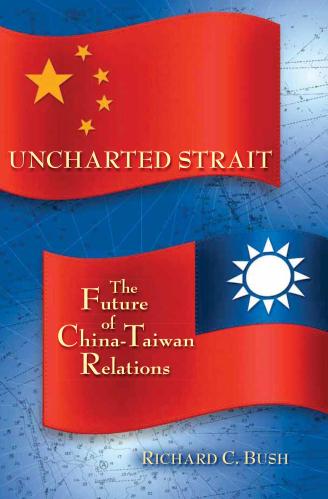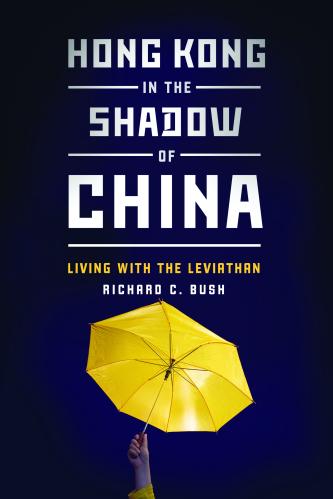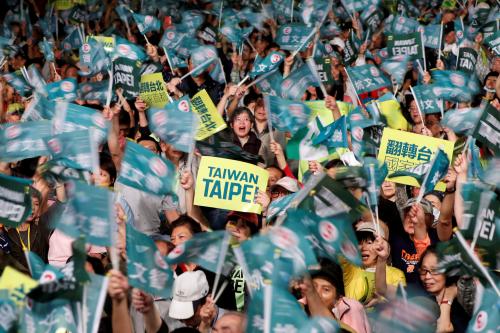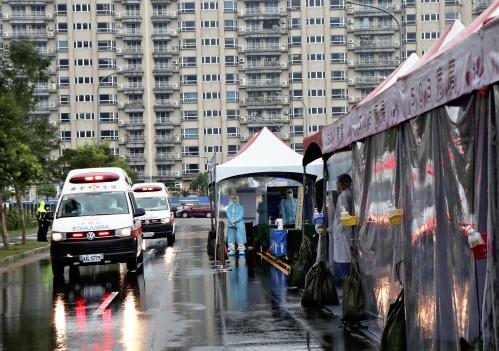The mood in Taiwan’s presidential office felt funereal as I settled into an overstuffed chair and awaited the arrival of President Tsai Ing-wen for a meeting with an unofficial delegation I was a member of in December 2018. The week prior, Tsai’s political party had experienced a drubbing in local elections, losing 15 out of 22 mayoral or magistrate positions. Prominent Taiwan press commentaries described the outcome as a vote of no confidence in Tsai’s leadership and an indictment of her failure to deliver on campaign promises. Following Taiwan’s political custom, Tsai had resigned her political party chairmanship and publicly accepted responsibility for the defeat. There was speculation that Tsai would not run for re-election in 2020, or if she did, that she may not secure her party’s nomination.
Tsai entered the meeting room on that drizzly December day in her typically unassuming fashion, somberly greeting her visitors and quickly dispensing with welcoming comments in front of the media. After the media left the room, she was herself again — inquisitive, quick-witted, detailed, calm, and steady. She took everything except for herself seriously, just as she had in each of the four other meetings I had been in with her in the previous four years.
Fast forward a year and a half and Tsai’s political fortunes have improved dramatically. Not only did she fend off a challenge from within her own party to secure the presidential nomination, she also was re-elected president with the largest vote total in Taiwan’s history. According to a February 2020 public opinion poll, Tsai’s approval rating had reached 68.5%, a more than 40% jump from her December 2018 lows. Tsai now stands on the cusp of a second term as president. She will be inaugurated May 20 in Taipei.
In many respects, Tsai Ing-wen has emerged as the Angela Merkel of Asia. While there are limits to the analogy, the basic point is that, like Merkel, Tsai has been steady, methodical, technocratic, competent, and quick to seize opportunities to advance her agenda.
One of the first opportunities Tsai seized was a New Year’s speech by Chinese President Xi Jinping on January 2, 2019. The speech, a commemoration of the 40th anniversary of a statement to Taiwan compatriots on New Year’s Day 1979 (the day the U.S. and China established diplomatic relations), was a long-winded recitation of China’s determination to achieve peaceful reunification. Xi’s speech also emphasized the concept of “one country, two systems” — a policy in use with Hong Kong — as a future model for Taiwan.
Speaking from the presidential office in Taipei several hours later, Tsai delivered a short and sharp rebuttal. In her response, Tsai established a link between two concepts that Xi had espoused — “one country, two systems” and the “1992 consensus.” Tsai suggested that to support the “1992 consensus” (i.e., both sides of the Taiwan Strait belong to one China with different interpretations) was to lend legitimacy to the idea of Taiwan becoming a future Hong Kong under a “one country, two systems” model. Since the concept of “one country, two systems” was deeply unpopular in Taiwan, Tsai effectively used Xi’s speech to set a political trap for her presumptive presidential challenger, Kuomintang (KMT) candidate Han Kuo-yu. The speed and strength of Tsai’s response to Xi’s speech earned her plaudits from across Taiwan’s political spectrum, burnishing her image as a defender of Taiwan’s democratic way of life.
On matters of identity and cross-Strait relations, Tsai has been disciplined in the face of pressures from Beijing as well as from within her own political party. Many “deep Green” supporters (i.e. more fervent members of the base of her Democratic Progressive Party) have been unhappy with Tsai’s caution. They have criticized Tsai variously for her unwillingness to push the Taiwan independence envelope and for her deliberateness in managing relations with the United States at a time of increasingly visible sympathies in Washington toward Taiwan. Dissatisfaction with Tsai’s principled approach was so sharp as to prompt a challenge from the “deep Green” wing of her own party for the presidential nomination.
Next, Tsai retooled the focus and message of her presidency toward the priorities she espoused in her 2016 presidential campaign — invigorating the economy, creating jobs, and inspiring a sense of optimism about Taiwan’s future. In her first two years in office, Tsai had pushed through a necessary but unpopular pension reform, passed a labor law that both business and labor disliked, and advanced the phase-out of nuclear energy. Other measures, such as raising the cigarette tax and requiring the removal of aging motorbikes and trucks from roadways, had done more to aggravate Tsai’s working-class base of support than to alleviate their challenges.
After her party’s electoral setback in 2018, Tsai concentrated on policies and messages that connected with citizens’ lives. She saw through the legalization of same-sex marriage, an important promise kept to a segment of her political base. She also focused her daily messages on bread-and-butter issues around jobs and opportunity.
Relative to its Asian tiger peers (South Korea, Singapore, and Hong Kong), Taiwan’s economy was faring well. Economic growth was steady and unemployment rates remained low. Taiwan’s economic growth also was supported by a steady pattern of local businesses reshoring from mainland China to Taiwan, a trend that Tsai ably sold as a vote of confidence in Taiwan’s future.
Source: International Monetary Fund
Tsai’s re-election prospects also were strengthened by violent protests in Hong Kong. The nightly images of protestors battling against armed police served as a backdrop to the campaign. Tsai regularly invoked Hong Kong as a cautionary tale of Beijing’s ambitions to tighten its grip on Taiwan. The slogan “Hong Kong today, Taiwan tomorrow,” regularly appeared at her campaign rallies. Tsai grabbed the political space as the defender of Taiwan’s democratic identity and never let go.
Tsai grabbed the political space as the defender of Taiwan’s democratic identity and never let go.
When the votes were counted on January 11, Tsai secured 57% of support in a three-way race. Tsai’s performance outpaced her party’s legislative candidates, who secured 33.9% of proportional representation in the Legislative Yuan, compared to 33.3% for the opposition KMT.
In the months since the election, Tsai has demonstrated grit in leading Taiwan’s response to the COVID-19 pandemic. She has relied on science, preparedness, clear and consistent communication with the public, a strong health system, and technocratic competence to shield Taiwan from the worst effects of the virus. Following its effective initial response to the outbreak, Taiwan has garnered goodwill around the world by sending medical supplies and know-how to those in need.
As President Tsai looks ahead to another four years in office, she has little room for complacency. She confronts an economy in contraction as the after-effects of COVID-19 reverberate throughout Taiwan’s economy. She also will face ethical and policy questions around the balance between individual liberties versus protection of public health. At a broader level, Taiwan also could find its economic model as a supplier of semiconductors and intermediate goods for complex global value chains come under stress, particularly if the United States tightens export control requirements on semiconductors to China, and if Taiwan’s largest trading partners respond to COVID-19 by placing greater priority on resilience and self-sufficiency over efficiency of production. Additionally, Beijing is nearly certain to continue its campaign of intimidation, pressure, and cooptation as it seeks to wear down Taiwan’s psychological confidence and discourage Taiwan from distancing itself further from the mainland. Tsai also will face the challenge of managing her own succession, as she will be term-limited from running for a third term.
Throughout the challenges that await, Tsai can be counted on to remain herself — calm, steady, and competent.
The Brookings Institution is committed to quality, independence, and impact.
We are supported by a diverse array of funders. In line with our values and policies, each Brookings publication represents the sole views of its author(s).










Commentary
Taiwan’s Tsai Ing-wen enters second term with a strong political mandate, but no room for complacency
May 13, 2020